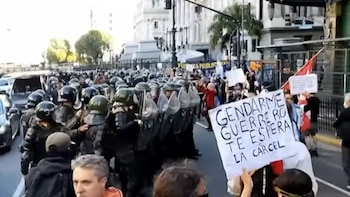
(ATR) Dick Pound, as the IOC’s longest-serving member, usually gives a closing statement at the end of each IOC Session.
The question is whether he will use his time on Friday to broach his fears of a potential worst-case scenario for the Olympics.
Pound, speaking with Reuters on Wednesday, says that should the postponed Tokyo 2020 Games not be held next summer, then it is likely Beijing 2022 would also not happen.
"Taking the political side out of it for the moment say there is a COVID problem in July and August next year in Tokyo, it is hard to imagine there is not going to be a knock-on effect in the same area five months later," Pound says.
The Beijing Games are scheduled to begin on Feb. 4, 2022, less than six months after the re-scheduled Tokyo 2020 is set to end on Aug. 8, 2021.
Pound says that the IOC focus at Friday’s first virtual Session will understandably be on Tokyo 2020.
A status report on Beijing 2022 will be presented to members during the meeting, but Pound admits "Beijing is really not on the table at the moment and I think it would be an unnecessarily complicated thing to bring that in because we simply do not know about it yet."
But there’s nothing stopping the IOC doyen from bringing it to the attention of his fellow IOC members during his closing comments.
Agenda for First Virtual Session
Once planned for three days in Tokyo, the inaugural online IOC Session is now streamlined to four hours on Friday.
The agenda will include reports from each of the seven organizing committees handling upcoming games from Tokyo next year through to Los Angeles 2028 and two Youth Olympic Games: Gangwon 2024 and Dakar 2026. The IOC members will be asked to ratify the Executive Committee decision announced on Wednesday postponing the Dakar YOG from 2022 to 2026.
IOC Coordination Commission chair John Coates will lead off the reports with his observations about Tokyo 2020. The postponement has produced a series of issues to solve. How many are settled and how many are proving vexing will be watched for a barometer on prospects for the Games.
With finance issues raised by the postponement, a report by the finance commission will be another signal from the IOC as to the impact of delaying the Games by one year.
Elections are scheduled for Executive Board seats. There are two vice presidential slots open with Ugur Erdener of Turkey and Spain’s Juan Antonio Samaranch Jr. ending their four-year terms. Two seats are also open for regular members of the EB. Olympian Sergey Bubka from Ukraine and Ser Miang Ng of Singapore will be stepping down.
The procedures for voting have not been announced publicly. In a regular IOC Session, electronic devices are used by the members to record and quickly tally the votes. But those voting boxes weren’t designed for virtual application. Assuming there may be multiple contestants for each of the seats, voting could take up to an hour in a normal IOC Session with all the members gathered in one place.
While not specifically mentioned in the agenda of the Session, the date of July 17 corresponds this year to the centennial of the birth of former IOC President Juan Antonio Samaranch. He led the IOC from 1980 to 2001 and died in 2010. Recognition of the IOC leader is expected at some point during the meeting.
After the Session ends, there will be a tribute to Samaranch held at the Lausanne church where he attended mass during his time in the Olympic city.
Written by Gerard Farek
For general comments or questions,click here.
Your best source of news about the Olympics is AroundTheRings.com, for subscribers only.
Últimas Noticias
Utah’s Olympic venues an integral part of the equation as Salt Lake City seeks a Winter Games encore
Utah Olympic Legacy Foundation chief of sport development Luke Bodensteiner says there is a “real urgency to make this happen in 2030”. He discusses the mission of the non-profit organization, the legacy from the 2002 Winter Games and future ambitions.

IOC president tells Olympic Movement “we will again have safe and secure Olympic Games” in Beijing
Thomas Bach, in an open letter on Friday, also thanked stakeholders for their “unprecedented” efforts to make Tokyo 2020 a success despite the pandemic.

Boxing’s place in the Olympics remains in peril as IOC still unhappy with the state of AIBA’s reform efforts
The IOC says issues concerning governance, finance, and refereeing and judging must be sorted out to its satisfaction. AIBA says it’s confident that will happen and the federation will be reinstated.

IOC president details Olympic community efforts to get Afghans out of danger after Taliban return to power
Thomas Bach says the Afghanistan NOC remains under IOC recognition, noting that the current leadership was democratically elected in 2019. But he says the IOC will be monitoring what happens in the future. The story had been revealed on August 31 in an article by Miguel Hernandez in Around the Rings

North Korea suspended by IOC for failing to participate in Tokyo though its athletes could still take part in Beijing 2022
Playbooks for Beijing 2022 will ”most likely” be released in October, according to IOC President Thomas Bach.




